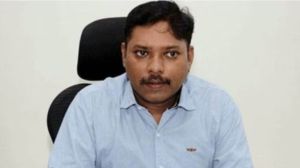Justice Abhijit Gangopadhyay not the first: When two SC judges quit judiciary to run for office
While former CJI K Subba Rao stepped down three months before retirement to contest the 1967 presidential elections, Justice Baharul Islam was a Congress MP before he joined the judiciary and resigned in 1983 to return to Parliament
 By resigning from the judiciary and announcing his decision to join politics on Tuesday, former Calcutta High Court judge Abhijit Gangopadhyay has sparked a conversation on the propriety of such a move by a judge. (PTI)
By resigning from the judiciary and announcing his decision to join politics on Tuesday, former Calcutta High Court judge Abhijit Gangopadhyay has sparked a conversation on the propriety of such a move by a judge. (PTI)By resigning from the judiciary and announcing his decision to join politics on Tuesday, former Calcutta High Court judge Abhijit Gangopadhyay has sparked a conversation on the propriety of such a move by a judge. Gangopadhyay said he would join the BJP, most probably on Thursday, and that it was up to the party to decide if he would contest the Lok Sabha elections.
In the past, there have been two instances of sitting judges who have resigned to contest elections, albeit in different circumstances.
The first example is former Chief Justice of India (CJI) Koka Subba Rao. He took charge as CJI on June 30, 1966, succeeding Amal Kumar Sarkar. He resigned within just a year of assuming office and three months before his retirement. The circumstances under which he resigned generated a lot of talk at the time.
In February 1967, Subba Rao led the majority in “handing the government a defeat in the Golaknath case,” writes legal scholar George H Gadbois in his book “Judges of the Supreme Court of India (1950–1989)”. The judgment ruled that Parliament would have no authority to take away any of the Fundamental Rights. This, Gadbois writes, “was one of the most significant constitutional law decisions in the Court’s history up to that time”.
The same month saw the fourth parliamentary elections in which the Congress returned to power by winning 283 seats. Two months later, on April 11, came Rao’s resignation. Subba Rao, considered one of the most outspoken judges on matters of fundamental rights, was invited by Swatantra Party’s Minoo Masani, the Leader of the Opposition in Parliament, to be the United Opposition’s candidate for the presidency of India in 1967. Politically, the Congress was still the dominant force even though it was seeing a challenge. Subba Rao accepted the nomination for the presidential polls a day later. Zakir Hussain who was the Congress nominee defeated him by 1.07 lakh votes. Each MP had 576 votes and the number of votes for each state legislator differed from state to state based on population. There were 520 Lok Sabha MPs at the time and 220 Rajya Sabha members. The value of votes was based on the 1961 Census.
After the election, Subba Rao continued to write and publish several books. He was also a staunch critic of the Emergency imposed by Indira Gandhi in 1975.
Justice Baharul Islam
The second example is of former Supreme Court judge Baharul Islam who resigned six weeks before his retirement and contested the 1983 Lok Sabha polls as a Congress candidate from Barpeta in Assam.
Unlike Subba Rao, Islam was involved politically from his youth. Gadbois writes that from 1948 to 1956 Islam was a member of the executive committee of the Assam Socialist Party. A qualified lawyer, he joined the Congress in 1956 and held several posts in the Assam Congress unit between 1957 and 1972. He was even elected to the Rajya Sabha on April 3, 1962, on a Congress ticket and got another term in 1968. He was with the Congress (I) after the party split in 1969.
Subsequently, on January 20, 1972, he resigned from the Rajya Sabha and accepted his appointment as Gauhati High Court judge. Islam was elevated to the Supreme Court on December 4, 1980.
On January 13, 1983, he announced his resignation. A day later, he got the Congress nomination from Barpeta. The Lok Sabha elections were scheduled to be held weeks later. But, due to unrest caused by the Assam agitation, the election in Barpeta could not be held. The Congress accommodated Islam by the Congress again. In May 1983, he became a Rajya Sabha MP again.
Islam’s links to the Congress were put to scrutiny by the press, writes Gadbois. “Although not the first SCI to resign to enter the political arena, in Islam’s case the criticism was heightened by the fact that, just a month earlier, he had written the controversial majority judgment which granted Bihar’s Congress (I) Chief Minister Jagannath Misra a reprieve from trial for forgery and criminal misconduct.”
Sections of the press, Gadbois writes, “raised the question of whether there was a quid pro quo between his opinion in that case and his nomination from Mrs Gandhi’s government”.
Photos


- 01
- 02
- 03
- 04
- 05




























